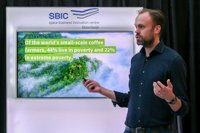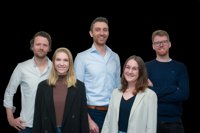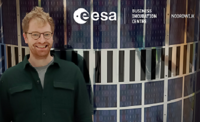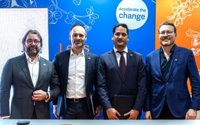20 years of ESA BIC: entrepreneurship in space requires many talents
How do you turn an innovative idea into a successful (space) company? What talents are needed for this? And which resources are indispensable? We asked four alumni of the space incubator ESA BIC Noordwijk.
What started in 2004 as an experiment by ESA and the Dutch government, grew into a breeding ground for space entrepreneurs: ESA BIC Noordwijk. This space incubator provided more than 150 startups with space knowledge, a network, financial resources and more.
Anyone who looks at the alumni file of ESA BIC Noordwijk will immediately notice one thing: space is no longer the exclusive domain of engineers and technicians. Now that we see applications of space everywhere in society, and space itself becomes more and more commercial, different disciplines are needed to start a successful business.
Carble: fundraising and marketing are becoming more important
Sander Reuderink has been an alumnus of ESA BIC since 2023. His company Carble uses satellite data to combat deforestation on coffee and cocoa plantations: 'It is a current theme, because the European Union's new deforestation law will come into effect in January 2025. Suppliers must then demonstrate that no deforestation has occurred for the production of their goods.'
Reuderink himself worked in the coffee sector for many years. He has benefited greatly from the incubation process at ESA BIC and the support of NSO. It provided new contacts from other worlds, sp
Sander Reuderink © SBIC Noordwijk
ace in the forefront. Moreover, he was able to work together with fellow entrepreneurs who encountered the same start-up problems as he did.
“Five years ago you could still raise money with one impressive PowerPoint presentation,” says Reuderink. 'Nowadays you have to show that you already have turnover and understand very well what the customer needs. That is why we not only put a lot of energy into our technical solutions, but also into fundraising and marketing, for example.'
Sensar: innovationplans offer start-up capital
Arjan Tabak from the Sensar company has a similar experience. Five years ago he started his company at the ESA BIC incubation program. He now employs twelve people, including someone who focuses on the business side of the company. His tip for new entrepreneurs: make sure you bring enough diversity into your team, because then you can serve customers better.
'We provide information about land subsidence to municipalities, water boards and companies. Knowledge of remote sensing, geo-information and artificial intelligence are extremely important to us. But customers are mainly interested in the solution to their problems. Even though we work with technology, ultimately customer demand is always central.'
Team Sensar with Arjan Tabak in the middle © Sensar
In addition to practical support in starting a business and an opportunity to significantly expand his network, Tabak benefited from start-up capital. This was partly due to the NSO, because the company submitted and was granted several SBIR applications.
'The SBIR innovation instrument is very important to us. Especially if there is a customer with a specific problem. For example, we helped the municipality of Amsterdam to investigate the maintenance status of bridge and quay walls. This resulted in a very useful and practical satellite application.'
Spherical: ESA BIC is a quality mark
Carble and Sensar use space to solve a social issue. The most recent ESA BIC alumnus (August 2024) works the other way around. Spherical designs hardware specifically for space.
Co-founder Thomas Parry: 'Inspired by Apple's iPhones, we design microchips that are precisely tailored to the hardware they have to function in, in our case: satellites. Our chips are smaller, more relia
Thomas Parry © SBIC Noordwijk
ble and more flexible in use than the generic microchips currently used.'
In two years, Spherical grew from two to twelve people. The incubation period at ESA BIC played an important role, says Parry: 'Our customers put a lot of time and energy into their satellites. So they are not likely to do business with a party they do not know. ESA BIC, the NSO and the Dutch space ecosystem give us a certain credibility. If you complete the ESA BIC correctly, it is a quality mark.'
smartQare: students give the team a nice balance
ESA BIC alumnus smartQare developed a medically certified solution to monitor vital values of people inside and outside the hospital with the same sensor. A small device on the upper arm measures a patient's heart rate, breathing, temperature, saturation and movement and transmits the measurement data to the cloud via the Internet of Things.
“We were the odd ones out at ESA BIC,” says founder Ronald Olie. 'On the one hand because we were already in our fifti
Left: Ronald Olie
es, and on the other hand because we were the only ones in the incubator with a medical application. Our connection with space is that our product uses satellite navigation for location determination.'
As a startup, smartQare raised millions of euros in investments, mainly from business angels. The secret according to Olie: a very diverse team of almost thirty people, including a large number of students. 'They are young, innovative and enjoy working together. This is very inspiring for us, the older generation, and creates a good balance in the team.'
Like the other entrepreneurs who have been part of ESA BIC in recent years, Olie is convinced that as an entrepreneur you should not stay in your attic room, but should come out with good ideas: 'Look for feedback to further develop your idea. to make it better. Seek that feedback from people with a completely different background than yourself. Because to build a successful company you need technicians, but certainly also commercial, creative and other talents.'